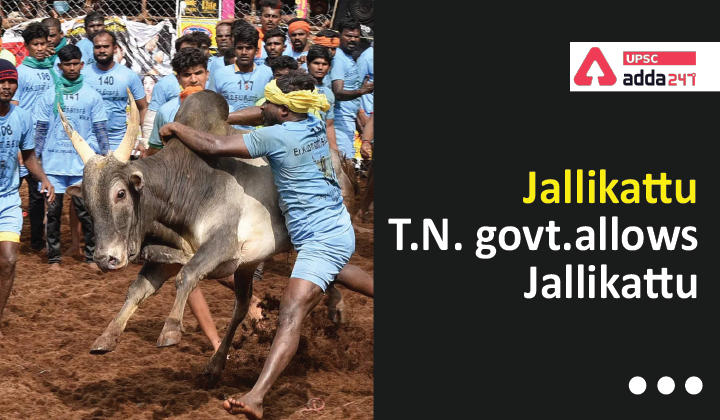Table of Contents
Jallikattu- Relevance for UPSC Exam
- GS Paper 1: Indian History- Indian culture will cover the salient aspects of Art Forms, Literature and Architecture from ancient to modern times.
Jallikattu- Context
- Despite the surge in COVID-19 cases, the Tamil Nadu government recently allowed the conduct of Jallikattu, Manjuvirattu and Vadamadu.
- Only 50% of the seating capacity can be filled, and the number of spectators at the Jallikattu event will be capped at 150 to ensure adherence to physical distancing norms.
National Sports Awards 2021: Sports and Adventure Awards 2021 and List of Winners
Jallikattu- Key Points
- About: Jallikattu is a competitive sport in Tamil Nadu to honour bull owners who rear them for mating.
- Jallikattu is a violent sport in which contestants try to tame a bull for a prize; if they fail, the bull owner wins the prize
- Jallikattu is also referred by other names such as Yeruthazhuvuthal, Madu Pidithal, and Pollerudhu Pidithal.
- Jallikattu Belt: Jallikattu is mostly popular in Madurai, Tiruchirappalli, Theni, Pudukkottai and Dindigul districts of Tamil Nadu. This region is also known as the Jallikattu belt.
- Timing: Jallikattu is celebrated during the Tamil harvest festival, Pongal (typical in the second week of January).
Draft National Air Sports Policy | NASP 2022
Jallikattu- Importance in Tamil Culture
- Preserving Native Bulls: Jallikattu is considered a traditional way for the peasant community to preserve their pure-breed native bulls.
- At a time when cattle breeding is often an artificial process, conservationists and peasants argue that Jallikattu is a way to protect these male animals which are otherwise used only for meat if not for ploughing.
- Respect among Natives: The owners of premium Jallikattu breed bulls command respect locally.
- Kangayam, Pulikulam, Umbalachery, Barugur and Malai Maadu are among the popular native cattle breeds used for Jallikattu.
Development of Sports in Rural India
Jallikattu- Evolution of the Legal Battle
- 2007: Animal Welfare Board of India and the animal rights group PETA moved petitions in the Supreme Court against Jallikattu as well as bullock cart races.
- 2009: The Tamil Nadu government, however, worked its way out of the ban by passing a law in 2009, which was signed by the Governor.
- 2011: Centre added bulls to the list of animals whose training and exhibition is prohibited.
- 2014: the Supreme Court banned the bull-taming sport, ruling on a petition that cited the 2011 notification.
- 2017: To nullify the 2014 order of SC, the Tamil Nadu government released an ordinance amending the central Act and allowing Jallikattu in the state.
- This was later ratified by the President.
- 2018 (Present Situation): the Supreme Court referred the Jallikattu case to a Constitution Bench, where it is pending now.
National Youth Festival 2022- PM to Inaugurate 25th National Youth Festival
National Youth Festival 2022- PM to Inaugurate 25th National Youth Festival




 TSPSC Group 1 Question Paper 2024, Downl...
TSPSC Group 1 Question Paper 2024, Downl...
 TSPSC Group 1 Answer key 2024 Out, Downl...
TSPSC Group 1 Answer key 2024 Out, Downl...
 UPSC Prelims 2024 Question Paper, Downlo...
UPSC Prelims 2024 Question Paper, Downlo...




